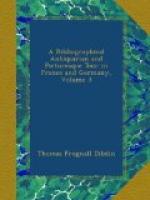Latin. I delivered the letter which I had received
at Salzburg, and proceeded to the library. In
proceeding with the Librarian along the first corridor,
I passed a portly figure, with an expressive countenance,
dressed precisely like the Duke of Norfolk,[102] in
black waistcoat, breeches, and stockings, with a gray
coat. He might seem to be a sort of small paper
copy of that well-known personage, for he resembled
him in countenance as well as in dress. On meeting,
he saluted me graciously: and he had no sooner
passed, than my guide whispered in my ear, “THAT
is the famous bibliographer, the ABBE STRATTMAN, late
principal librarian to the Emperor.” I
was struck at this intelligence; and wished to run
back after the Abbe,—but, in a minute,
found myself within the library. I first went
into a long, narrow, room—devoted, the greater
part, to MSS.:—and at the hither end of
which (that is, the end where I entered) were two
figures—as large as, and painted after,
the life. They were cut out in wood, or thick
pasteboard; and were stuck in the centre of the space
between the walls. One was an old gentleman, with
a pair of bands, and a lady, his wife, opposite to
him. Each was sitting upon a chair. A dog
(if I remember rightly) was between them. The
effect was at first rather
startling; for these
good folks, although they had been sitting for the
best part of a century, looked like life, and as if
they were going to rise up, and interrogate you for
impertinently intruding upon their privacy. On
nearing them, I found that the old gentleman had been
a great pedagogue, and a great benefactor to the library:
in short, the very MSS. by which we were surrounded
were
solid proofs of his liberality. I
was urgent and particular about the
contents
of these MSS.; but my guide (otherwise a communicative
and well-informed man) answered my questions in a manner
so general, as to lead me to conclude that they had
never been sufficiently examined. There might
be at least four thousand volumes in this long and
narrow room.
From thence we proceeded, across a passage, to a small
room—filled with common useful books, for
the young men of which the monastic society is now
composed; and who I learnt were about one hundred and
twenty in number. There were, however, at one
end of this room, some coins and medals. I was
curious about ascertaining whether they had any Greek
gold coins, but was answered that they had none.
This room is divided into two, by a partition something
like the modern fashion of dividing our drawing rooms.
The whole is profusely ornamented with paintings executed
upon the walls; rather elegantly than otherwise.
The view from this library is really enchanting—and
put every thing seen, from a similar situation at Landshut,
and almost even at Chremsminster, out of my recollection.
You look down upon the Danube, catching a fine sweep
of the river, as it widens in its course towards Vienna.
A man might sit, read, and gaze—in such




